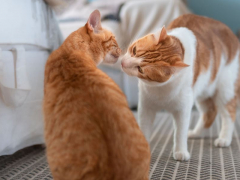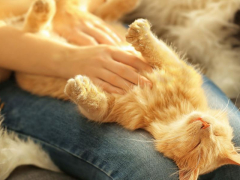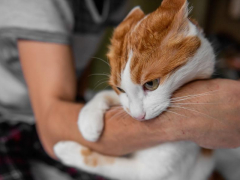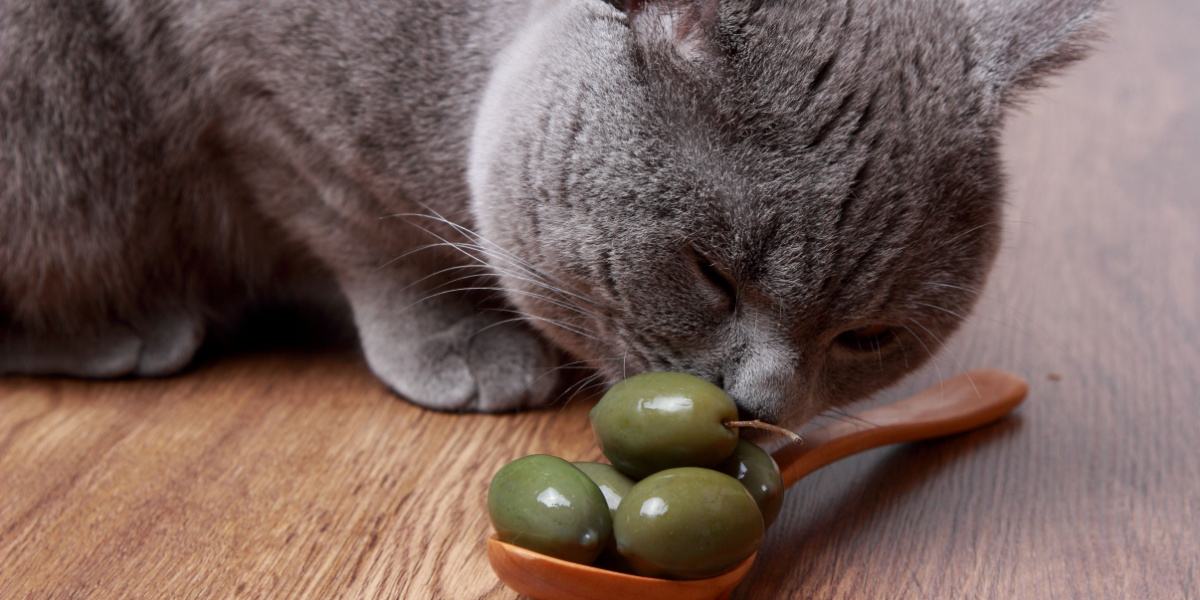
Have you ever noticed your cat go crazy when there are olives on the table? It might sound strange, but you’re not alone.
Cats are particularly attracted to the taste and smell of olives and often get excited or exhibit some strange behaviors making it seem like they are obsessed with olives. There’s a genuine reason behind this silly behavior that comes across like an obsession, and that’s because of the chemical compounds found in olives.
Many pet owners worry about their cat’s apparent obsession with olives and ask if olives are safe for cats to eat. Olives are safe and nontoxic to cats, but there are a few safety concerns to be aware of before feeding them to your feline companions.
Why Do Cats Go Crazy for Olives?
Olives contain isoprenoids, specifically a compound called nepetalactone, which is the same compound that’s found in catnip. So it’s a no wonder cats go crazy for olives.
Nepetalactone enters the nose when your cat smells olives and is detected by the highly specialized organ at the back of your cat’s throat called the vomeronasal organ, an organ that scientists have discovered humans do not have.
The vomeronasal organ is like a nose-brain, and it is designed to detect pheromones—chemical signals that share information with other cats, including the fact that they are ready to breed. Nepetalactone stimulates the pheromone receptors in the vomeronasal organ. However, there is another theory, as some scientists have noticed that the olfactory system in a cat’s nose might also be involved in the way cats respond to nepetalactone.
Cats respond to this in a variety of ways but typically become very playful and excited, often jumping and skipping around, or drooling and stretching. Their eyes might seem wide with the pupils dilated.
Sometimes cats can become very relaxed and chilled, and more receptive to a cuddle. But some cats don’t react at all and occasionally cats can even become aggressive. It’s thought that a cat’s response to nepetalactone is genetic, which is why some cats have a strong reaction and others have no reaction at all.
Different olives contain different amounts of nepetalactone, and the more they contain the sillier behavior your cat is likely to show. Green olives and pimento olives contain most, but the different varieties can vary again, some olives might make your cat more interested in the smell and taste than others.
Can Cats Eat Olives?
All varieties of green olives and black olives are safe and nontoxic to cats, but they should still only be consumed in small quantities. Olives are regarded as “healthy” for cats, but they don’t really provide cats with any nutritional value and are empty of calories.
A small olive every so often is OK, but no more often than a couple of times a week. Remember that any treats should only make up 10% of your cat’s daily food intake.
Health Benefits of Olives for Cats
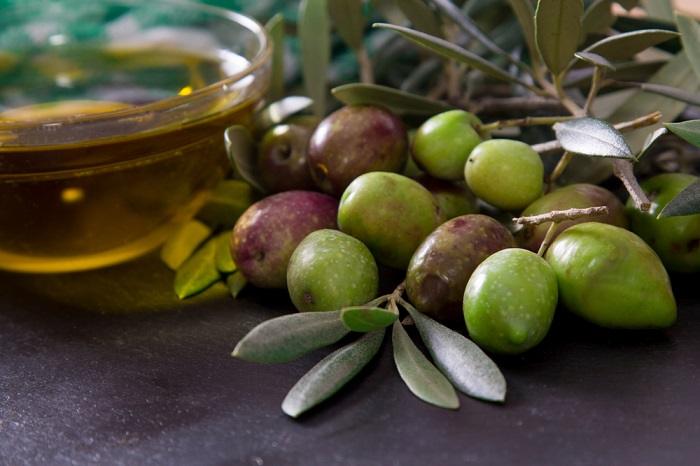
The antioxidants found in olives might offer health benefits to cats when fed in small amounts.
Olives are rich in vitamins C, A, and E, all of which are thought to improve immune function, eye health, skin health, and heart health. But sadly, these additional vitamins don’t have much benefit to cats as they obtain all the nutrition that they need to stay healthy from their usual cat food.
Cats are obligate carnivores, so they need to consume mostly meat and protein to stay healthy, with fruit and vegetables forming a much smaller part of their diet.
Olives are also thought to have anti-inflammatory properties as they contain antioxidants. These antioxidants remove free radicals that can damage cells and lead to diseases such as cancer and heart disease.
Some say that this can have beneficial effects on cats suffering from arthritis, however, there are a number of other nutritional supplements available that are scientifically proven to improve your cat’s symptoms. Always speak to your vet before giving your pet any nutritional supplements.
Also Read: The 8 Best Cat Vitamins And Supplements
What About Olive Oil?
Olive oil is considered to form part of a healthy balanced diet for humans, but what about cats? Although there are many claims about its benefits, olive oil should be fed to cats with caution. It is safe and nontoxic, but too much oil can cause upset tummies in cats, leading to some mild vomiting and diarrhea. A very small amount of oil shouldn’t cause your cat any harm, but larger amounts will make them feel unwell.
Also Read: Best Omega 3 Fish Oil For Cats
Dangers of Olives for Cats
The main danger associated with olives is the pit or stone that’s found in the center of olives. Many pre-prepared olives are already pitted, but several varieties are not. If you are going to treat your cat to an olive, remove the stone entirely, and don’t leave the stones lying around anywhere your pet can get their paws on them.
The pit of an olive is a choking hazard for cats, and if they do manage to swallow it there’s a high risk of it causing an obstruction in the gut which can have serious consequences. If your cat has swallowed an olive pit, seek advice from your veterinarian straight away.
Olives contain a high amount of salt, especially if they have been preserved in brine. Cats cannot tolerate the levels of salt (sodium) in their diet that we humans can, and too much salt can make them unwell. This is a particular concern for cats with heart or kidney disease as excess sodium can have more harmful effects on them.
Symptoms of sodium poisoning include vomiting, diarrhea, lethargy, increased thirst, and excessive urination. Severe cases of sodium toxicity can also lead to tremors and seizures. There are also some concerns about olives for cats with diabetes, as they might suffer from insulin sensitivity when consuming olives and therefore struggle to regulate their blood sugar levels after eating them.
Too much olive oil, or licking the oil that olives are stored in, can also make your cat unwell. Though safe in small quantities, the oil can cause some mild tummy upsets including vomiting and diarrhea. If your cat is experiencing vomiting or diarrhea that is not resolving, or if they seem unwell in any other way, seek advice from your veterinarian.
It’s also important to remember that olives are often stuffed with other foods to enhance their taste, including garlic and chiles, or other herbs and spices. Garlic is toxic to cats, and chiles cause irritation to the inside of your cat’s mouth and gut, so you never feed food-stuffed olives to your pet.
Final Thoughts
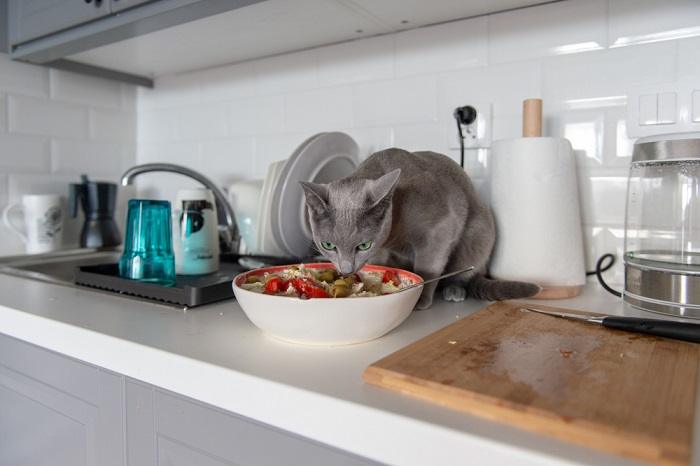
It’s OK for your cat to nibble on a pitted olive now and then, but don’t overdo it.
Cats can often be seen to be experiencing a euphoric reaction to olives, and that’s because olives contain the same compound as catnip. Nepetalactone is found in olives, just like catnip, which is why so many cats can seem obsessed with the smell and taste of olives.
Some cats become relaxed when they smell or taste olives, while others become skittish or very playful. Some cats don’t react at all, which is thought to be genetic.
Olives are a safe and nontoxic food for cats but should only be fed in moderation as an occasional treat. The pits of olives can pose a risk to cats, and they are high in salt. Too many olives or too much olive oil can make cats unwell. If you’re concerned, you should always speak to your vet for advice.
Also Read: The 5 Best Catnip Products For Cats (Spray & Toys and More Surprises)
